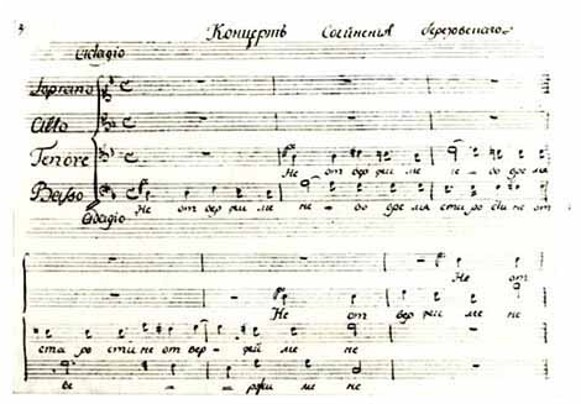Berezovsky, Maksym
Berezovsky, Maksym [Березовський, Максим; Berezovs’kyj], b 27 October 1745 in Hlukhiv, d 22 March 1777 in Saint Petersburg. A prominent composer, one of the creators of the Ukrainian choral style in sacred music (see Choral music). Berezovsky likely studied at the Kyivan Mohyla Academy and then sang with Kyrylo Rozumovsky’s kapelle and orchestra in Hlukhiv under Andrii Rachynsky, from whom he learned the principles of composition in the classicist style. He then moved to Saint Petersburg and sang in the court choir, while also studying composition under Francesco Zoppis. From 1759 to 1760 he performed as soloist with the Italian opera company in Oranienbaum near Saint Petersburg. From 1765 to 1774 he studied in Bologna, Italy, under Giovanni Battista Martini, and in 1771 gained the title of maestro di musica and became a member of the Bologna Philharmonic Academy. In 1775 he returned to Saint Petersburg, where, as a result of court intrigues and difficult circumstances, he committed suicide.
Berezovsky was the first major representative of the early Classicist style in Ukrainian music. He was the composer of the opera Demofonte, which was staged in Leghorn, Italy, in 1773; of a sonata for violin and harpsichord; and of a series of sacred works (12 concertos and a full cycle of liturgical chants), of which only a few have been preserved. His recently discovered Symphony No. 11 is the first symphonic work written by a composer from the Russian Empire and serves as evidence of a considerable number of Berezovsky’s other instrumental compositions that have been lost. His most outstanding choral works are the concerto Ne otverzhy mene vo vremia starosty (Do Not Forsake Me in My Old Age), liturgical music for ‘Otche nash’ (Lord's Prayer) and ‘Viruiu’ (Credo), and four communion hymns—‘Chashu spaseniia’ (Chalice of Salvation), ‘V pamiat' vichnuiu’ (In Eternal Memory), ‘Tvoriai anhely svoia’ (Let the Angels Create), and ‘Vo vsiu zemliu’ (Over All the Land)— which are musically related to Ukrainian folk songs and to the tradition of Kyivan church singing (see Kyivan chant).
BIBLIOGRAPHY
Kudryk, B. Ohliad istoriï ukraïns'koï tserkovnoï muzyky (Lviv 1937)
Steshko, F. ‘Berezovs'kyi i Motsart (Z istoriï ukraïns'koï muzyky XVIII st.),’ Naukovyi zbirnyk UVU, 3 (Prague 1942)
Matsenko, P. Dmytro Stepanovych Bortnians'kyi i Maksym Sozontovych Berezovs'kyi (Winnipeg 1951)
Vytvyts'kyi, V. Maksym Berezovs'kyi: Zhyttia i tvorchist' (Jersey City 1974)
Rudchuk, Iurii. Dukhovna muzyka v Ukraïni (XVIII do XIX st.): Istoryko-muzykoznavche doslidzhennia (Kyiv 2006)
Iurchenko, Mstyslav. ‘Maksym Berezovs'kyi v Hlukhovi: Muzychne zhyttia mista,’ Literatura ta kul'tura Polissia no. 102 (2021)
Marko Robert Stech, Wasyl Wytwycky
[This article was updated in 2024.]
.jpg)
.jpg)

